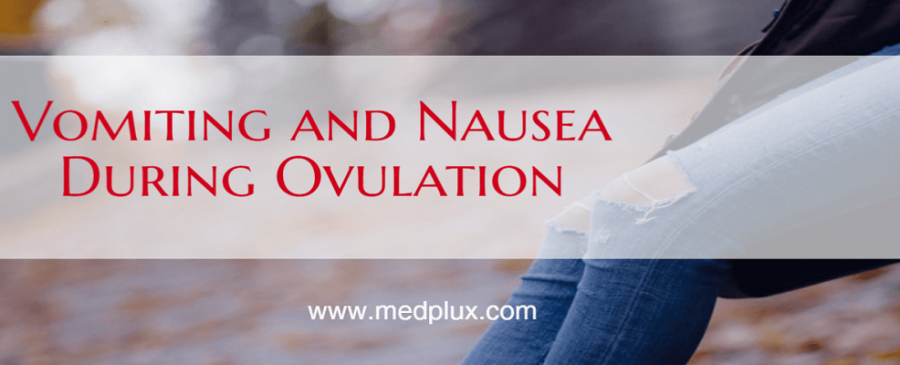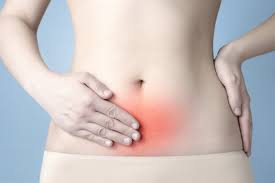Vomiting and Nausea During Ovulation: Is It Normal Or Pregnancy Sign?

Last updated on July 27th, 2018 at 01:01 am
Question: What causes vomiting and nausea during ovulation?
Menstrual period usually starts in a lot of girls between the ages of 12 and 16. After your first menstrual period, your body hormones adjust, and you notice new symptoms before and during your period.
One new problem after your “first period” is belly pain before and during your menstrual period. In some women, this pain may also occur weeks back when you’re ovulating with the feeling of throwing up.
Nausea can happen anytime in your menstrual cycle and can be discomforting to a lot of women.
After your monthly period ends, women will get into their ovulation period a week later. During ovulation, which is the cyclical release of an egg from your ovary, some women will get nausea feeling.
If your menstrual cycle is 28 days, ovulation usually takes place a week after your period has ended (On day 14).
Is nausea during ovulation normal?
The truth is, if you get nausea during ovulation, it’s not abnormal, so don’t panic all the time. In most cases, it’s due to hormones changes during ovulation.
Then again, feeling nauseous may be a sign of pregnancy, especially if you’ve missed your period. Also, If you’ve mistaken implantation bleeding for your period, you will get nausea. Nausea is a common symptom during early pregnancy.
On the other hand, there are other causes of nausea (apart from ovulation). Stomach flu, food poisoning, peptic ulcer, acid reflux, and drugs may cause women to have nausea.
This guide explains why you have nausea during ovulation, other medical causes of nausea and how to identify if your nausea is due to pregnancy or not.
What causes nausea during ovulation?
If you are experiencing nausea during ovulation, it’s likely nothing to worry about. Here are common causes you should know.
1. Hormone change during ovulation
During your menstrual cycle, different hormones will rise and fall to ensure ovulation takes place.
At the start of your menstrual cycle, estrogen, which is produced by the follicular cell of the ovaries, will continue to rise.
Around ovulation, estrogen levels drop with an increasing level of luteinizing hormones. Hours after LH surge, ovulation will occur.
If you get nausea around this time, don’t panic. Ovulation nausea usually last for a few days.
2. Pain and nausea
Having ovulation means your ovaries are working normally and releasing an egg into the fallopian tube.
During ovulation, some women will feel pain in their abdomen that may trigger nausea.
3. Drugs you’re taking
There are certain medications you are currently taking that would make you have nausea and vomiting.
 Antibiotics, antidepressants, vitamins, iron supplements, non-steroidal anti-inflammatory drugs (NSAIDs) – aspirin, ibuprofen, naproxen, can cause you to feel nauseous.
Antibiotics, antidepressants, vitamins, iron supplements, non-steroidal anti-inflammatory drugs (NSAIDs) – aspirin, ibuprofen, naproxen, can cause you to feel nauseous.
If you are uncertain of what medications you’re ingesting, it’s necessary you consult with your doctor regarding likely side effects.
Then again, if you’ve been diagnosed with cancer, chemotherapy drugs will cause you to feel nauseous. Usually, anti-nausea drugs are given to ease nausea and vomiting when on these medications.
Also, if you are currently on drugs to boost fertility, like Clomid, there is a chance you could feel nauseous. It’s vital you take nothing for granted and see your physician for advice.
4. Stomach flu
Feeling nauseous may sometimes be due to stomach flu. If you’ve taken contaminated food and water, you are likely to have gastroenteritis that affects your stomach and intestines. This may cause some women to have nausea.
Other symptoms of stomach flu are vomiting, abdominal pain and fever.
5. Gastroesophageal reflux disease (GERD)
GERD means, after eating, some stomach content is pushed back into your esophagus. Symptoms are feeling nauseous, vomiting, chest pain and heartburn.
GERD is quite common and affects about 10 to 20 percent of men and women in the western world. Talk to your doctor if any of the above symptoms show up.
How to stop Nausea and vomiting during Ovulation
If you are getting nauseous during your ovulation period, it’s important to detect why it’s happening. If it’s due to hormone changes during your menstrual cycle, in a few days, you will start feeling better.
On the other hand, stomach flu and food poisoning will make you nauseous for many days.
If you currently feel nausea, you can try one of these natural methods to stop nausea fast.
1. Use Ginger
If you’re having nausea or vomiting during ovulation, you can try one of the oldest and reliable methods that still work.
Ginger works by reducing nausea feeling, relaxing stomach muscles, neutralizing stomach acids and increasing saliva secretions in your mouth that aids digestion.
How to prepare ginger for nausea treatment
- Get ginger, wash to ensure it’s clean, peel and cut into small pieces.
- You can continue to chew small pieces throughout the day every 4 hours
- Better still, you can purchase a snack that contains ginger
2. Use pyridoxine (vitamin B6)
In women who are having severe nausea and vomiting, taking vitamin B6 helps make you feel better. A daily dose of 25 t0 200mg may be required to ease off nausea.
3. Use anti-nausea drugs
Please note: talk to your doctor before you start medications to stops nausea. Some of these medications could affect your baby if you are actually pregnant, and not recommended during pregnancy.
The commonest type of nausea drugs used are promethazine, ondansetron, and metoclopramide.
Is nausea during ovulation sign of pregnancy?
The truth is if you’ve not had sexual intercourse during your fertile window, nausea at any time during your menstrual cycle is not due to pregnancy.
To get pregnant, sperm will fertilize the ovum from the women, resulting in pregnancy.
On the other hand, if you experience nausea after weeks of unprotected sexual intercourse, it may be due to pregnancy.
One common sign experienced by some women during early pregnancy is light vaginal spotting that is black or dark colored. This spotting (implantation bleeding) will take place a few days before your next menses.
A lot of women may not recognize implantation bleeding and nausea may be the first noticeable pregnancy sign.
You should test in a clinic close to you and confirm if you are pregnant or not.
Other pregnancy symptoms are
- Breast pain, itching, and soreness
- Mood change
- Food aversion
- Fatigue
How long does ovulation nausea last?
During ovulation, you will experience different symptoms which include watery discharge, increased sexual drive, bloating, and breast pain.
Some women will experience belly cramps too. If you get nausea, it usually does not last for long.
Don’t forget; some women will experience nausea within two weeks before their period. This is a sign your menses will start soon.
If you have a fever, feel weak with persistent stooling inform your doctor.
Here are real-life experiences and stories
I am 33 with no child and suffering from nausea when I ovulate. I also throw up at least once during this time. My tummy will become hard and I feel like being sick during ovulation. It has been occurring for a couple of months. I will also get mild to severe headaches as well. Is it normal I feel this way or am I pregnant?
I also experience nausea and severe headaches at the time of ovulation – also abdominal bloating. It appears to have become even worse as I am now over 40 years. I truly feel awful and no longer have the urge for food.

Annyia
My very predictable and accurate cycle for the past 8years changed after what I thought was ovulation spotting but now realise was the start of a different cycle. I have always had cramps, muscle fatigue, diarrhoea and hot and cold flashes during my period but now I get nauseous and also lose my appetite during ovulation. should I be worried?
Dr. Dunn A.
If it’s happening for the first time, it may not be something serious. But you should know there are other reasons for feeling nauseous. Be sure you see your doctor if there are other symptoms.